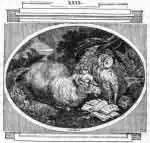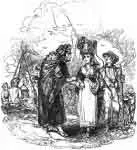A blind Sheep scheduled surgery with Oculist Owl. The Sheep asked about the world and Owl said all was the same. Sheep said stop; didn’t want to see that.
Sometimes improvements might not be considered help.

JBR Collection
A certain poor Sheep was so unfortunate as some years before his death to become blind, when the Owl, who had assumed to himself the profession of Oculist to His Majesty the Eagle, undertook to cure him. On the morning when the operation was to have been performed, the Sheep placed himself in the seat, and asked the Oculist if all things were ready for cure? The Oculist answered, “Yes, his instruments and plaisters were all prepared, and nothing wanting. [sic] “Ay,” says the Sheep; “the things you have mentioned are of least importance towards giving one that satisfaction I desire by the recovery of my sight: tell me, how goes the world?” “Why, even just as it did,” says the Owl, “when you fell blind.” “Sayest thou so, friend?” replied the Sheep. “Then, prithee, hold thy hand and proceed no farther, for I would not give a blade of grass to recover my sight, if I must again be punished in beholding enormities so odious in the eyes of all innocent creatures on earth.”

Northcote
[Note: The Northcote fable is the same fable as in the JBR Collection above. Only the illustrations and Application associated with the fable in the Northcote book are displayed here.]
Application
Sarah Dutchess of Marlborough used to say, that she hoped in the next world, she should not be sensible of what was passing in this, as it would effectually destroy all possibility of her being happy; and most certainly to a feeling mind, it is a melancholy view to witness the frequent ill-use made of power in this lower world, the insolence of pride, the oppressions heaped on unresisting innocence, the pernicious arts of knavery, the conceit of ignorance, the affectations of folly, the prosperity of impudence, the success of quackery, the suffering victims of idleness, the ruin which attends on vice, and the dreadful termination of the wicked.
All these are disgusting sights, not to mention those of terror, which are found to be necessary in order to curb depravity, and though often repeated yet with little effect, such as dungeons, halters, axes, gibbets, burning pitch barrels and faggots, or the degrading punishments by pillories, ducking-stools, branding irons, &c. &c. J. N.

